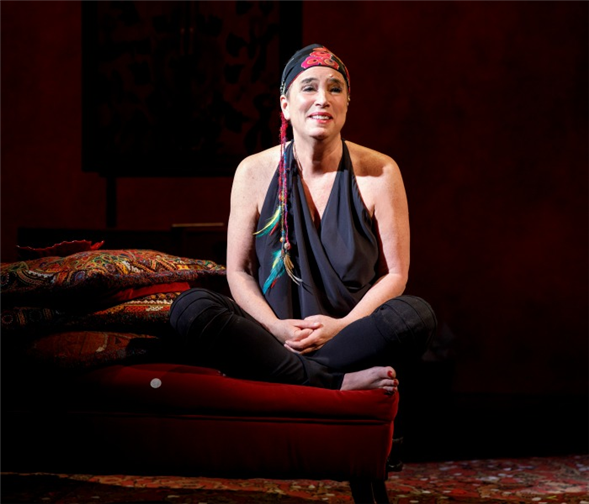Helping Eve Ensler Translate Her Story to the Stage
Home > TDF Stages > Helping Eve Ensler Translate Her Story to the Stage

Tony winner Diane Paulus directs the activist’s memoir-based solo show
—
As the artistic director of Cambridge’s American Repertory Theatre, Diane Paulus is known for guiding large-scale musicals such as Pippin, Finding Neverland, and Waitress to Broadway. But the Tony winner’s latest import is decidedly more intimate: In the Body of the World, an autobiographical solo show written and performed by feminist icon Eve Ensler.
After her taboo-busting play The Vagina Monologues turned her into an internationally celebrated artist and activist, Ensler created V-Day, which has raised more than $100 million to help stop violence against women and girls. In 2006, the nonprofit founded the City of Joy, a refuge for war-ravaged women in the Democratic Republic of the Congo. But during its early stages of construction, Ensler was diagnosed with stage 4 uterine cancer, which inspired her memoir In the Body of the World.
In 2016, Ensler teamed up with Paulus to theatricalize her story for the stage at A.R.T., and now the very personal yet politically charged play is running at Manhattan Theatre Club’s City Center Stage I. TDF Stages talked with Paulus about their collaboration, the process of adapting a book for the theatre, and how such serious subjects still manage to inspire laughter and dancing.
Sandy MacDonald: I know A.R.T. mounted another Ensler show, O.P.C., in 2015. How did you two first meet?
Diane Paulus: I had been a super-fan from a distance for many, many years. She came to see Pippin, and we went out afterward to some little dive in Times Square. I’ll never forget how encouraging she was to me about the show and being a woman director. I, in turn, had my chance to say, “I’ve admired you for years, what you do as an activist and artist, and maybe you should come up to A.R.T.?” We agreed to take on her play O.P.C.; also, at that little divey restaurant, she handed me her memoir. By the time she came up to Cambridge for O.P.C. I said, “What about a commission to turn your book into a piece of theatre?” Because when I read the memoir, I was knocked out by the writing. It was filled with humor and philosophy and a viewpoint on the world that is so strong and clear, and yet it was so deeply personal. My mother, unfortunately, passed away from cancer, so it was very specific for me. I asked Eve, “Would you let me direct it?” and we started the process of adaptation.
MacDonald: So you shaped the script together?
Paulus: I went to her loft and we kind of looked at each other, like, well, what do we do? And I said, “Why don’t you just read the book out loud to me?” She got a tall glass of water and we sat in her kitchen and she read the whole memoir. It took four or five hours. She was reliving it — she was crying through portions of it — and I just listened. Then with my staff at A.R.T. we started to help her think about how to edit it. What could be focused? Where could video take us? What are the sections? What is the rhythm of the piece?
MacDonald: It’s so well-structured and you brought out the actable moments. Audiences might expect another solo show delivery on a stool, yet it’s so physicalized.
Paulus: I was taking all the cues from the text. From the get-go I thought, we’re going to put all the range of emotion and action and expression that’s in the memoir onstage. We’re going to live it! When I started working with her, it just flowed out. This is Eve talking to us, telling her story. What I wanted to bring into the theatre was sort of a meta-experience of what I had of her sharing it with me in the loft.
MacDonald: You really brought out what humor there is in the text. I think that’s something that people won’t expect.
Paulus: It is so full of humor! One of her big key points was understanding that humor is the way to move people, to wake people up. That’s kind of signature Eve. And she’s so good at it.
MacDonald: She even gets the audience moving. Or rather, you did?
Paulus: It’s a long haul, and I just thought, we have to get up at some point! This whole show’s about getting in your body, and we’re just sitting watching. So, you know, seventh-inning stretch. We tried it out Cambridge, but it was a big question: Will they get up and dance in New York City? And they have been. It has been amazing.
MacDonald: Has the show changed much since Cambridge?
Paulus: We had such a beautiful run, but then in preparation for this, she read the whole thing out loud for me, again, and, you know, the world has changed. There were quite a few edits, like the list of “things not to think about on day four of chemo.” In the course of rehearsals, when she talks about climate change, she added “murderous mudslides.”
MacDonald: How has it been for you, switching gears from directing the massive productions you’re known for?
Paulus: It was so intense and so personal! But you know, the thing about Eve: it’s one person, but it’s the whole world. We’d rehearse a little, she’d work on a section, and it would always naturally roll into talking about what’s happening politically. I mean, we were very disciplined! We’d run the play, do blocking. But the process of making the show was also a dialogue that involved the world we’re living in. So it never felt that it wasn’t big, in a way. The world was in the room with us.
—
TDF MEMBERS: At press time, discount tickets were available for In the Body of the World. Go here to browse our current offers.
Sandy MacDonald is a theatre critic who contributes to Time Out New York. Follow her at @sandymacdonald. Follow TDF at @TDFNYC.
Top image: Eve Ensler in In the Body of the World. Photos by Joan Marcus.
